
Terrible News
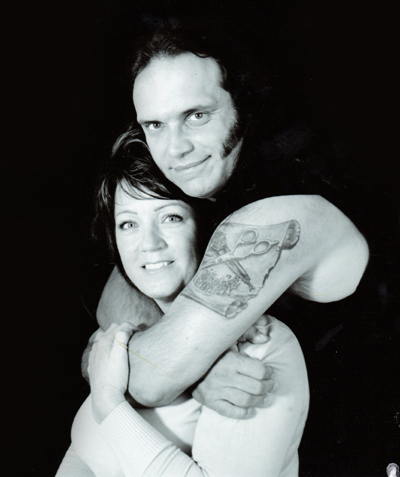
Blaze Bayley, former *Iron Maiden* singer and frontman of his own band *Blaze* recently had his wife Debbie pass away. While [talking asbout this terrible news](https://www.roadrunnerrecords.com/blabbermouth.net/news.aspx?mode=Article&newsitemID=106859) I found the following one of the saddest things I have ever read:
> “Just as things really seemed to be going our way, Debbie suffered a second huge brain haemorrhage. She had brain scans and was taken into intensive care. After this, we think, she suffered another smaller bleed in her brain. However much reality I was faced with I refused to accept that there was no hope for recovery. But when reality is a top consultant doctor, spelling out bit by bit the true magnitude of Debbie’s condition, and when you are in his office with the people, who you have shared the hope, tears, and desperation of these days with you, and when you look at each other without needing words between you. Then it is no longer a case of fighting to keep hope alive, to stop the last shreds of hope being taken from you. But as the soft confident voice says the words that describe the condition of your loved one’s brain, then hope is given up. Hope melts away. It is something so precious but without worldly value and it is replaced silently and cruelly by a desperate fatalistic feeling, that feeling enters the soul that, now, has no hope”.
I don’t know Blaze other than meeting him a few times at gigs, and when I have met him he has been the nicest, most genuine guy I have met. Blaze, if you ever happen to stumble over this blog entry by random, or by someone else who knows someone, who knows someone else passing it on…hang in there brother, you are in our hearts.

Ohio Linuxfest = Great
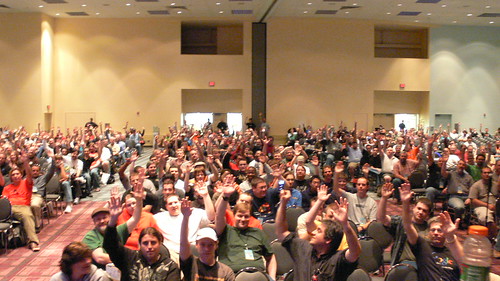
*In my talk I asked how many people use Ubuntu. This was the result. Wow.*
A few days ago I headed to Columbus, Ohio to take part in [Ohio Linuxfest](https://www.ohiolinux.org/). I was there to provide the closing keynote – a new presentation that I have been thinking a lot about recently called *Building Belonging*.
OLF is an excellent, excellent event. A great range of speakers, exhibitors and an excellent attendance (1000+) provided a very loose, fun, but informative atmosphere. The organisers knew what they were doing, were running on fumes for much of the time, and were 100% committed to making OLF kick arse. And you know what, it really did. They have pulled off a stunning event there, and attending shows like OLF gets me really buzzed up.
I arrived on Thursday evening, Jorge picked me up from the airport and we headed out with some of the organisers. Jorge and I then spent Friday working, and Friday night we hit the pre-party. I woke up a little tender on Saturday after an evening of Jaegerbombs with the OLF organisers, The Linux Link Tech Show guys, some Ubuntu folks and some other people. I ran through my slides one more time and then headed to the show. Did a videocast interview, interview with The Linux Link Tech Show, lunch with Debra from Prentice Hall and then back for a book signing alongside Mad Dog. I always find signing books a little weird – not sure why, it just feels weird – people like Stephen King should be signing books, not me.
Throughout the day I had some really interesting conversations. The Ohio Ubuntu LoCo team did an excellent job, the Ubuntu BOF went really well, I caught up with Zonker from OpenSuSE and Paul from Fedora, chatted with Mad Dog for a while, met the Dual Core guys and talked Severed Fifth, talked to some guys about community growth in less-tech-orientated areas, and many more.
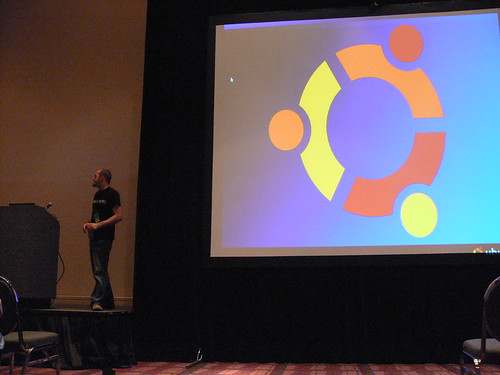
A little later it was keynote time. The room was huge. Really. Damn. Huge. There was a great turn-out, the audience were fun, and they seemed really receptive to my message. The core of my presentation was exploring the concept of *belonging* – how we can build communities that are truly participatory with a real feeling of engagement and association. I explored the different elements involved in building belonging – associational life, a gift economy which builds social capital, and exploring how to build a sense of belonging, beginning with teams. As an added bonus (!), on the Friday night when hanging out with the Linux Link Tech Show guys, Dan decided to moon me, so I took a snap of the horror show with my camera. I was all set to get the photo off my phone and include it in the talk, but Bluetooth decided to throw a hissy-fit. So, in the presentation I got Dan up on the podium to re-create that magical moment, and the audience lapped it up. Fortunately for us all, the magic was captured and [uploaded to YouTube](https://www.youtube.com/watch?v=OmON_ymm3-4).
That night there was the after-party and for extra amusement we organised an Open Source Dance Off. It was quite possibly, the most amusing thing I have ever seen. It involved nixternal from Kubuntu, Greg from the CC, Kevin from Forsight and a bunch of other guys. Kevin won. Rich was gutted. I have never, ever seen anyone in my life move like Rich Johnson. It is the pure, unfiltered definition of the statement “*what he lacked in rhythm he made up for in enthusiasm*”. Methinks this may be replicated at UDS. 🙂
So, all in all, a great show. Thanks to the organisers, to everyone who was so kind to me there, and I will be back next year for sure. 🙂

Severed Fifth Sneak Peeks 1 + 2

Alright, get your seatbelts on, your engines running and get ready for a couple of sneak peeks of the final songs of the debut Severed Fifth album *Denied By Reign*. Grab them from below:
* Sneak Peek 1 – [Ogg](https://www.severedfifth.com/releases/music/deniedbyreign/sneakpeeks/1.ogg) [MP3](https://www.severedfifth.com/releases/music/deniedbyreign/sneakpeeks/1.mp3)
* Sneak Peek 2 – [Ogg](https://www.severedfifth.com/releases/music/deniedbyreign/sneakpeeks/2.ogg) [MP3](https://www.severedfifth.com/releases/music/deniedbyreign/sneakpeeks/2.mp3)
This week I will be releasing two sneak peeks from *Denied By Reign* every day. Stay tuned for more! I will also be releasing additional promotional content and features.
*Denied By Reign* is released on Oct 21st from [www.severedfifth.com](https://www.severedfifth.com/) and the entire album will be released under a [Creative Commons Attribution ShareAlike](https://creativecommons.org/licenses/by-sa/2.0/) license with expressed aim of seeing how far an independent musician such as myself can push and promote an album under the new music economy of free culture. My aims are to help answer some of the questions that are unknown about the viability of a free culture music economy. For more details on the aims of the project, see the [announcement](https://www.severedfifth.com/news/2008/06/severed-fifth-launched/).
Severed Fifth needs your help to be successful! Go and join our [Discussion Forums](https://www.severedfifth.com/forums/) and join the [Street Team](https://www.severedfifth.com/streetteam/). We will need your help when the album is released to push it as far and wide as possible and just see how much juice we can squeeze out of a free culture album. If you have contacts in the music press, or you know established artists who may be interested in hearing it, do get in touch with me. I am preparing a press pack for the album which we can all send out when the album is released. Oh, and for you Facebook fanatics – go and join the [Severed Fifth Facebook Group](https://www.facebook.com/group.php?gid=60451700536).
I just want to thank everyone for their support of the album and the project. Thanks also to the Creative Commons for their continued support. 🙂
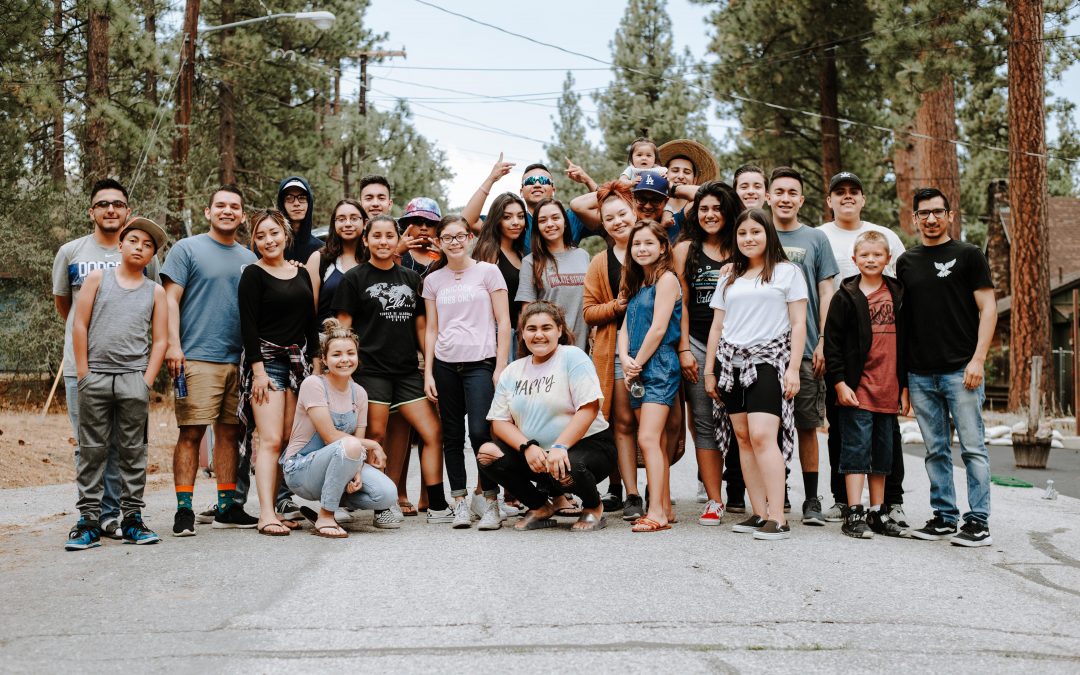
Denied By Reign Released In One Week
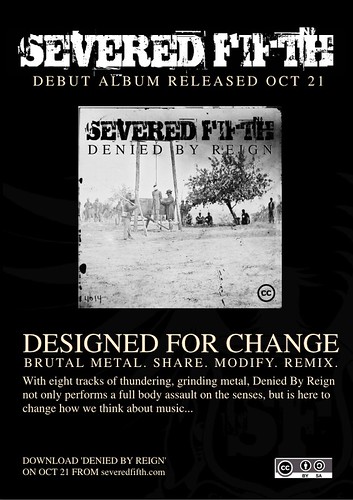
A week tomorrow, I will be releasing the debut Severed Fifth album *Denied By Reign*. October 21st, head over to [severedfifth.com](https://www.severedfifth.com/) and grab it. Also, based upon feedback, I will be releasing the entire album under a [Creative Commons Attribution ShareAlike](https://creativecommons.org/licenses/by-sa/2.0/) license.
Every day this week I will be releasing a new sneak peek of the album. I am really intensely proud of it and cannot wait to get it out there. Stay tuned for more as the week progresses…

First Review
Rich Johnson (nixternal) on listening to the completed [Severed Fifth](https://www.severedfifth.com/) album *Denied By Reign*:
> “Oh yeah…this is the kind of shit I want to listen to before I break into someone’s house and rob them.”
Denied By Reign. Released Oct 21st.

Ubuntu Free Culture Showcase Winners Announced!
[DIGG THIS STORY](https://digg.com/linux_unix/Ubuntu_Free_Culture_Showcase_Winners_Announced)!!
I am absolutely tickled pink to announce the winners of the [Ubuntu Free Culture Showcase](https://wiki.ubuntu.com/UbuntuFreeCultureShowcase)!
For those of you living under a rock for the last few months, the Ubuntu Free Culture Showcase was an initiative that we ran to showcase free culture artists in each version of Ubuntu. Each time we release a tasty new Ubuntu, we include a package full of example content (rather craftily named…*example-content*), and with Ubuntu being installed on so many computers around the world, it is a great opportunity to bring the Ubuntu ethos to the creative arts and showcase some free culture content.
To do this, a while back I [announced the competition](https://archivedblog.jonobacon.com/?p=1225) and we had a slew of entries. We then asked a carefully chosen panel of creative types in the Ubuntu community (Cory Kontros, Luis de Bethencourt, Luke Yelavich, Lydia Pintscher and Tony Whitmore) to pick their top three entries from each of the categories (Audio and Video) and then we sent the finalists to the Community Council to pick the winners. I am so proud to announce that the winners are:

|
Andrés Vidau (Audio Winner) Andrés Vidau was born in Mexico City in the roaring 70’s. It wasn’t very long before he found his way into playing the drums. He and 3 friends formed the band: GasMoztaza. Starting in music with some punk rock and ska rhythms. A few years later got into electronic music and formed the band: Caravanacid which enjoyed a moderate success within the Mexican Trance Scene. From Mexico City he moved to the Caribbean where he made underwater movies for diving tourism and then finally moved to Barcelona where he resides now. Patas de Trapo is a track that was born in a one-track side project, and in collaboration with guitar player Mauricio Barron, current member of indie rock band A Colores. With Mauricio playing the guitar and Andres sequencing the rest of the song. Andrés is an Electronics Engineer and Ubuntu user since Gutsy Gibbon. |

|
Andrew Higginson (Video WInner) Andrew is not your typical English computer user. He is fourteen and produces artwork on his computer, with Free Software. The likes of Inkscape and The GIMP are his tools, all for the low price of nothing. He discovered Ubuntu in the latter part of 2006 and since then hasn’t gone back. Projects like Wikipedia allowed him to develop his artwork skills, something he is very thankful for, as it allows him to ‘wow’ his friends as he does now. He loves the fact that Free Software enables someone with his lack of an income, to produce such great pieces of work, at such high quality, without having to break the bank. Free software has not only introduced him to unleash his creative side in computing, but to be able to give back to such programs that initially helped him is an extraordinary experience, that only free software can offer. His creation – ‘Stop Motion Ubuntu’ that you see in the Examples folder, was his first venture away from still images to moving ones. Again he only used free software, available in Ubuntu – and his webcam. While not sure how it would turn out, he is surprised at how well it was received and will certainly continue to use video as a new medium. When he hasn’t got homework scattered across the desk, Andrew spends most of his time creating artwork, coding with Python, helping new Ubuntu users (like he once was) via Launchpad Answers and when he can, writing on his blog. Generally he moves from project to project, helping out wherever he can. |
When we release Ubuntu 8.10 Intrepid Ibex, you will find both Andrés and Andrew’s submissions on the disc, exposing their work to millions of Ubuntu users. Congratulations guys!
Also, we are going to do this for every release of Ubuntu, so creative people…get those creative juices flowing ready for the Jaunty Jackalope Ubuntu Free Culture Showcase!

Ubuntu 8.10 Release Party: San Francisco
Fortunately, I will be in San Francisco when Ubuntu 8.10, the glorious Intrepid Ibex is released and as such, it would be remiss to not organise a bit of a knees up (translation for my American friends: “*drinks in a bar*”). So, in conjunction with partner in crime Tom Haddon, we are organising the Ubuntu San Francisco Release Party. Yes!
Here are the details:
* **WHEN?** – Thursday 30th October : 7.30pm
* **WHERE?** – The lower bar as you walk in on the left, The Thirsty Bear, 661 Howard St, San Francisco, CA 94105 : Tel: (415) 974-0905
* **HOW?** – [Google Maps](https://maps.google.com/maps?ie=UTF-8&oe=utf-8&rls=com.ubuntu:en-US:unofficial&client=firefox-a&um=1&cid=0,0,16117366048065422338&fb=1&dq=the+thirsty+bear+san+francisco+ca&daddr=661+Howard+St,+San+Francisco,+CA+94105&geocode=1316742886589430053,37.785478,-122.399714&sa=X&oi=local_result&resnum=1&ct=directions-to)
The plan is simple. *There is no plan*. We plan on just meeting up at The Thirsty Bear, having a few drinks and getting to know each other. Everyone is welcome, from any project, field or otherwise – just come along, meet some people and celebrate the new release. We have deliberately kept this as low-key as possible – the main idea is to meet new people and have a bit of fun. 🙂
If you want to come along, all you need to do is show up – feel free to post a comment on this blog if you will be there.
*This is one of many release parties. Go and see [Ubuntu 8.10 Release Parties In Your Area](https://wiki.ubuntu.com/IntrepidReleaseParties) and if there isn’t one in your area, why not [organise one](https://wiki.ubuntu.com/BuildingCommunity/RunningReleaseParty)!*

The Validity Of 5-A-Day
Yesterday my buddies over at the excellent [Ubuntu UK Podcast](https://podcast.ubuntu-uk.org/2008/09/25/s01e15-five-sleepy-heads/) did a segment on [5-A-Day](https://wiki.ubuntu.com/5-A-Day) where they were debating the merits of the initiative. I just wanted to weigh in with some comments.
The debate spawned into a few areas which I want to address separately.
Firstly, in terms of the success of 5-A-Day, it has been a roaring success so far. I have a graph that measures the workflow of the 5-A-Day team and the curve is constantly growing with over 14000 bugs being touched in 7 months; that is over 2000 bugs on average a month. That is *touched bugs*, but in terms of actual *bona-fide closed bugs*, that is over 8000 in 7 months. Daviey mentioned the number of members contributing to 5-A-Day seeming small; interestingly the number of people who are involved in the team fluctuates a lot – this is common with most community teams and groups, and auto-expiration of people from the team also contributes to fluctuating figures. Despite the team adjusting in size, the number of bugs touched with 5-A-Day has remained consistent, which suggests that people are doing more and more bugs each day and not limiting themselves to the suggested five. This quells any worries that five is an unobtainable figure – if it was, our stats would say otherwise.
It is also important to get the purpose of 5-A-Day in perspective. 5-A-Day is *not* intended for *everyone*. It *does* require a certain level of technical know-how. It *does* require someone to know the bug-tracking facilities in Launchpad. It *does* require someone to run the development version of Ubuntu. The purpose of 5-A-Day is to put a manageable figure on daily bug contributions. It sounds overly simplistic, but it works. When encouraging any kind of adoption or mass direction, it is essential to set fair expectations – this is what governments have done with the fruit and vegetable 5-A-Day – if you set a base-level of expectation, it provides a simple metric for people to strive for in their daily lives. Just think about all of the places this happens – counting calories in a diet, working out for a certain amount of time, running a certain distance three times a week, carbon offset expectations. Admittedly these are all measurements for a healthier and more balanced life, but that is the point of 5-A-Day in the Ubuntu world; getting our contributor community comfortable with a reasonable daily contribution so we can manage the bug list that we have. Not everyone will be able to do 5 bugs a day, some may only do one a day. Not everyone will be suitable for getting involved, but there are a large number of people who are suitable…between 140 and 200 who can make use of the initiative.
So, in a nutshell, 5-A-Day is not for everyone, but it is a great contribution for a good number of people, and with 5-A-Day we are 14000+ triaged bugs better off.
Another element of the discussion was the suitability of our resources in getting people skilled to contribute to 5-A-Day. Again, I want to set fair expectations here – to do 5-A-Day from no development or triaging experience will require quite a bit of perseverance, but it can be done. I think we have a pretty good set of resources in what we offer to help people get involved:
* Extensive documentation covering how to join the scheme, how to triage, different types of bugs and scenarios, and recently we have been working hard to get our general bugs documentation fixed up.
* For those who don’t like to read documentation, a stack of videos on packaging and other developer resources at the [Ubuntu Developer Channel](https://www.youtube.com/ubuntudevelopers]).
* A bunch of general IRC tuition sessions at not only [Ubuntu Open Week](https://wiki.ubuntu.com/UbuntuOpenWeek) but also [Ubuntu Developer Week](https://wiki.ubuntu.com/UbuntuDeveloperWeek) which happen every cycle. In addition to these two solid weeks of tuition we have weekly MOTU Q+A sessions, general help channels and [mailing lists](https://lists.ubuntu.com/).
* We also appreciate the value of face-to-face time so we are encourage individual [Bug Jams](https://wiki.ubuntu.com/RunningBugJam) as well as the [Ubuntu Global Bug Jam](https://wiki.ubuntu.com/GlobalBugJam) which happens on every cycle.
* We also have a [panel applet and 5-A-Day client](https://wiki.ubuntu.com/5-A-Day/Reporting) to make reporting easier about bugs tended to as part of 5-A-Day and share these achievements on blog entries and elsewhere.
* Oh, and 170+ [LoCo Teams](https://wiki.ubuntu.com/LoCoTeamList) to offer local help, support and in many cases…pub visits.
Without sounding arrogant, I think this is a pretty compelling roster of help and support for budding Ubuntu contributors. Again, this will not convert every potential contributor into a super mad-skilled Ubuntu rockstar developer, but it gives people a good start to get involved.
Finally, Daviey mentioned the sponsorship queue. Admittedly, the sponsorship queue has seen some tough times with items languishing there for a while. To help resolve this, I sat down with Daniel Holbach and we fleshed out some plans to resolve these issues, and part of this is that Canonical is requiring that every paid developer spends at least one hour a week tending to items on the sponsorship queue – this time commitment alone (around 25 hours a week) will be a significant contribution in getting the queue in shape. We still need the community to look after the queue too, and we have plans to help encourage this in the coming months.
Hope this helps clarify the situation a little.

Call For Intrepid Release Parties and Ubuntu’s 4th Birthday!
Ladies and Gentleman who love and adore the world most lovable and adorable Operating System, Ubuntu, we plan on releasing Ubuntu 8.10 Intrepid Ibex on October 30th. Now, this release is a pretty special release because not only do we kick out another kick-ass Ubuntu, but October 20th is Ubuntu’s 4th birthday!
As such, it is time to par-taaay. Seriously. The Beastie Boys faught for your right to partaaay, so show some dignity and respect to these rights, and get out there and do it.
So, what is the skinny, I hear you ask? Well, I think it is time for us to put our collective minds together and organise an incredible series of release parties all over the world. On our last release, we had over 60 parties, largely organised by our incredible [worldwide LoCo community](https://wiki.ubuntu.com/LoCoTeams), and I would love to see us hit nearer to 100 parties for this release, particularly with a birthday to celebrate!
Organising a party is pretty simple:
* Pick a date – I would recommend either Thu 30th October or the following weekend…Sat 1st Nov and Sun 2nd Nov. Pick a date when you can arrange for a bunch of Ubuntu enthusiasts to be in the same building.
* Pick a venue – this can be someone’s back yard, a pub, a university room, a school, a parking lot…wherever. They key thing is not the venue, it is the *people*. With a venue and date, you are all set to let the world know about it.
* Add your party to [this wiki page](https://wiki.ubuntu.com/IntrepidReleaseParties) – this is the *big list* of Ubuntu release parties. 🙂
* Let the world know – blog about it, make up some fliers and put them in computers shops / libraries / cafes / educational establishments etc. Encourage a stack of people to come along to your party. 🙂
We have a longer guide to organising a release party [here](https://wiki.ubuntu.com/BuildingCommunity/RunningReleaseParty). You can also discuss organising your party on the [ubuntu-event-planners mailing list](https://lists.ubuntu.com/mailman/listinfo/Ubuntu-event-planners).
When it comes to running your party, there are a bunch of things you can do on the day/evening itself:
* Have a cake – it is a birthday, after all! If you can’t bake a cake, find someone who can. 🙂
* Hang out with other Ubuntu people, meet new faces and get to know each other.
* You may want to perform installfests.
* You may also want to organise a few talks and speeches for the event itself.
* Why not make some merchandise to give out? Maybe some badges, stickers or t-shirts?
I will be in San Francisco then, and I am thinking of organising something there too. 🙂

Improving Ubuntu/Upstream Bug Workflow
Today we launched the beta of our [Ubuntu Upstream Report](https://edge.launchpad.net/ubuntu/+upstreamreport#). Jorge has [more details](https://stompbox.typepad.com/blog/2008/09/introducing-the.html) on how upstreams and Ubuntu contributors can make use of the report, but I wanted to spend a few moments telling the story behind the report.
Quite some time ago, we set ourselves up with the job of improving how we work with upstreams in a range of areas. To do this we hired Jorge to implement this work, and we decided to focus on bugs as our first action area. When trying to improve the relationship between two people, areas, or things, it is important to first define the *mechanics of interaction*. When thinking about the mechanics of interaction between Open Source projects, bugs offer a really exciting opportunity. Bugs are not only a common language between Open Source projects, but they also have a broadly similar schema – bug summary, description, state, associated patches, assignment etc. In a world with thousands of Open Source projects, bugs offer an interesting means of defining the connections between the thousands of dots. It is this kind of interconnected data that can be interesting in community improvement projects such as this.
Before we could begin improving our bug story though, we needed to understand more about the problem. Sure, we had ideas about how we could improve bug workflow, but the reality was that we were really just clutching at ideas and assumptions – we simply did not know enough about bug culture and the different approaches to bugs taken by upstream projects. Our first step was in understanding upstream bug workflow better. One key question here was:- exactly how can upstream projects make best use of our bugs?
To explain better, let me summarise the problem. Imagine you are using Ubuntu and something goes wrong. You suspect it is a bug, so you click *Help->Report a Problem* and you file a bug. We now have a bug in Launchpad in the Ubuntu project. Now, this bug is reasonably likely to actually exist in an upstream project. Imagine the bug was present in the GEdit text editor that we ship with Ubuntu – there is a distinct possibility that this bug is a bug in GEdit itself as opposed to a bug that we introduced while we build Ubuntu. It therefore makes sense to ensure that this distinction is noted, and to make this easier, we have a rather cool feature in Launchpad in which we can link an Ubuntu bug to a bug in an upstream bug tracker. In this particular example, if we found a bug in GEdit in Ubuntu and the bug is present in the upstream GEdit bug tracker, we can link the two bugs together. This link is also called a *watch*. This means that bug status changes in the upstream bug tracker will be reflected in the Ubuntu bug inside Launchpad. The goal here is that there should be one set of bug information that can be accessed from the upstream bug tracker and in Launchpad, and the two should be synced; multiple eyes on the same bug. Nice. 🙂
There were however two specific unknowns:
* Firstly, we had an suspicion that not that many Ubuntu bugs were getting linked to the upstream bug tracker. We had no fixed idea of this, but it was a hunch that we needed to quantify.
* Secondly, if we do link a bug upstream, we had no firm idea how useful an upstream actually find our bug data. Our discussions suggested very mixed reactions – a small project is likely to have a very different perspective on bugs than a large project. Just think about this in purely quantitative states – a small project will likely get fewer bugs, and these bugs can probably be dealt with by a small collection of volunteers. This is unlikely to scale to something like the Linux kernel or OpenOffice.org.
To help understand the latter problem more, we conducted an upstream survey, which some of you may have filled in. Surveys are a funny old beast, and a general issue survey can sometimes not yield particularly useful results, so we issued the same survey twice – first to an invitation-only range of upstreams who we knew would provide some objective commentary, and secondly we opened it up to anyone. A key element in this survey was asking about perspectives on bug workflow. We got a decent set of results (it is recognised in research that the magic number is 24 sets of results, so you don’t need hundreds of participants) and we assessed each set of results as well as combining the surveys. In addition to this we sat down and assessed other areas of bug workflow – watching how Ubuntu developers fix bugs and taking notes, developing bug jams further and improving our bug documentation.
But anyway, back to the upstream report specifically…
With every project that I approve on the community team at Canonical I want to see metrics. This is something we apply across the board. I have to admit, I am a bit of a graphing obsessive; it is interesting which conclusions and patterns that you can identify when you track a set of data, and this is particularly interesting when you match your data to your initiatives in the time-line. Of course, not everything can be graphed, but a lot can, and it really helps us build our community more effectively.
In terms of this project, I was keen to see graphs that show the number of upstream bug linkages going on, the total number of open vs. upstream bugs and how many bugs are fixed elsewhere. We could use these graphs to determine our progress in improving our bug workflow, but this was not enough – we also needed raw data about which projects needed the most focus. Which projects were struggling the most with bug figures? Which projects were not forwarding bugs upstream? Which projects didn’t have an upstream bug tracker registered in Launchpad? We had all the answers to these questions in Launchpad, but no means of gathering them. To fix this, we created the Ubuntu Upstream Report.
The Ubuntu Upstream Report that has hit beta today is the result of us sitting down and determining exactly what kind of data we wanted to know about upstream bug culture, and presenting this data in a means that helps us focus our efforts more effectively. The most critical focus with the report was to identify the Top 100 projects that need the most assistance with bug work – these projects are organised by open bug counts. We could then produce figures for each of these projects to identify how many upstream tasks are registered and how many of these tasks are links to upstream bugs. Combining these figures, it gives us an idea which projects are sucking at linking to upstream bugs.
With this kind of data available, it gives us the ability to drive our other initiatives that we have been building such as [Bug Jams](https://wiki.ubuntu.com/RunningBugJam) and [5-A-Day](https://wiki.ubuntu.com/5-A-Day). In fact, 5-A-Day is a key driver in how we can improve our bug linking story. Right now you can look at a project on the upstream report and click the number in the far right column to provide a list of bugs that have upstream tasks but no upstream link. A bug with an upstream task but no upstream link is likely to be considered an upstream bug, but it really needs the link to be made. All you need to do is find the upstream bug in the upstream bug tracker and link to it in the Ubuntu bug in Launchpad; this is a really useful and simple contribution to your 5-A-Day – nail five of these suckers a day, and you are flying. How cool is that – we can let our incredible 5-A-Day community know exactly what easily needs fixing in the Top 100 projects that need attention. That is *pure class in a glass*.
This is just one of a number of projects that we are working on to improve how we work with other entities in the Open Source world. We are really, really keen to not only build a strong and effective Ubuntu community, but to also ensure we can work as effectively with other projects and contributors too. Sure, we have some things to fix, but I am determined for us to resolve these problems and really drive through new opportunities to improve how we work together. This is one element in how we want to improve our relations with upstreams, so stay tuned for more as we develop our ideas.
